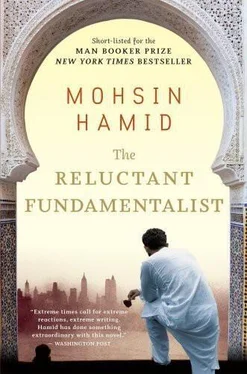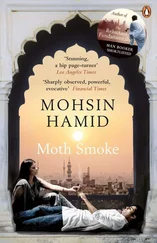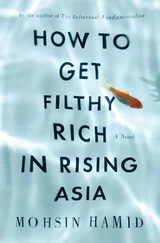I could not locate Erica in the rhythms or sounds of what she had written; it seemed a mistake, offered me no clues. It was so purposeful, so resolute in being precisely what it was that I was baffled. I was also powerfully affected. When I put down the manuscript, it was not with the conviction that Erica was either alive or dead. But I had begun to understand that she had chosen not to be part of my story; her own had proven too compelling, and she was — at that moment and in her own way — following it to its conclusion, passing through places I could not reach. I saw I had no option but to pursue my own preparations to leave.
I would like to claim that my final days in New York passed in a state of enlightened calm; nothing could be further from the truth. I was an incoherent and emotional madman, flying off into rages and sinking into depressions. Sometimes I would lie in bed, thinking in circles, asking the same questions about why and where Erica had gone; sometimes I would find myself walking the streets, flaunting my beard as a provocation, craving conflict with anyone foolhardy enough to antagonize me. Affronts were everywhere; the rhetoric emerging from your country at that moment in history — not just from the government, but from the media and supposedly critical journalists as well — provided a ready and constant fuel for my anger.
It seemed to me then — and to be honest, sir, seems to me still — that America was engaged only in posturing. As a society, you were unwilling to reflect upon the shared pain that united you with those who attacked you. You retreated into myths of your own difference, assumptions of your own superiority. And you acted out these beliefs on the stage of the world, so that the entire planet was rocked by the repercussions of your tantrums, not least my family, now facing war thousands of miles away. Such an America had to be stopped in the interests not only of the rest of humanity, but also in your own.
I resolved to do so, as best I could. But first I had to depart. I rode to JFK on a crisp, clear afternoon, an afternoon that reminded me of my trip to the institution and the view from that bluff above the Hudson. I thought of Erica removing her clothes and then, having shed her past, walking through the forest until she met a kindly woman who took her in and fed her. I thought of how cold she would have been on that walk. And so I left my jacket on the curb as a sort of offering, as my last gesture before returning to Pakistan, a wish of warmth for Erica — not in the way one leaves flowers for the dead, but rather as one twirls rupees above the living. Later, through the windows of the terminal, I saw that I had caused a security alert, and I shook my head in exasperation.
What exactly did I do to stop America, you ask? Have you really no idea, sir? You hesitate — never fear, I am not so rude as to forcibly extract an answer. I will tell you what I did, although it was not much and I fear it may well fail to meet your expectations. But first let us leave this market; the shutters are coming down, and some unsavory characters are lurking about. Where are you staying? The Pearl Continental, you say? I will walk you. No, it is not far, and although it is dark and parts of our route will at this time be deserted, we should be fine. Lahore is, as I have said before, quite safe from the standpoint of petty crime — and besides we are both fortunately possessed of those aspects of stature and appearance that tend to give ruffians pause.
FROM YOUR backward glance, sir, I gather you have noticed that we were not alone in our desire to depart. Yes, others have made their way to Mall Road behind us, such as that waiter who was so unusually attentive and yet seemed to rub against your grain. There is nothing surprising in that; the evening’s work is now done. I would ask you to direct your gaze instead to these lovely buildings — in varying states of disrepair — which date to the British era and function geographically and architecturally as a link between the ancient and contemporary parts of our city. How delightful they are: a chemist, an optician, a purveyor of fine saris, a gentleman’s tailor. Observe how often the words brothers and sons appear in their signage; these are family-run establishments, passed gently from generation to generation. No, not in the case of that retailer of guns and ammunition, as you correctly point out — but surely you must concede for the most part that they are charming and rather quaint.
These plazas are a different matter entirely, with their harsh outlines and cramped facades; they were built largely in the seventies and eighties, before the instinct of historical preservation began to take hold, and they mottle the surface of this area like an irritation of the skin. I find them particularly unpleasant at night, unlit and empty, bounded by those narrow passageways into which one could imagine being dragged against one’s will, forever to disappear! Yes, you are quite right: let us quicken our pace; we have a fair distance yet to cover.
Are you familiar with The Legend of Sleepy Hollow? You have seen the film, you say? I have not, but I am sure it was faithful; certainly the prose version was a most powerful work. One cannot but join in the terror of poor Ichabod Crane, alone on his horse, in that moment when he first perceives the presence of the Headless Horseman. I must admit, I am sometimes reminded of the sound of those spectral clip-clops when I go for nocturnal walks by myself. How they make my heart pound! But clearly you do not share my pleasure at this thought; indeed you appear decidedly anxious. Allow me, then, to change the subject…
I had been telling you earlier, sir, of how I left America. The truth of my experience complicates that seemingly simple assertion; I had returned to Pakistan, but my inhabitation of your country had not entirely ceased. I remained emotionally entwined with Erica, and I brought something of her with me to Lahore — or perhaps it would be more accurate to say that I lost something of myself to her that I was unable to relocate in the city of my birth. Regardless, the effect of this was to pull and tug at my moods; waves of mourning washed over me, sadness and regret prompted at times by an external stimulus, and at others by an internal cycle that was almost tidal, for want of a better word. I responded to the gravity of an invisible moon at my core, and I undertook journeys I had not expected to take.
Often, for example, I would rise at dawn without having slept an instant. During the preceding hours, Erica and I would have lived an entire day together. We would have woken in my bedroom and breakfasted with my parents; we would have dressed for work and caressed in the shower; we would have sat on our scooter and driven to campus, and I would have felt her helmet bumping against mine; we would have parted in the faculty parking area, and I would have been both amused and annoyed by the stares she received from the students passing by, because I would not have known how much those stares owed to her beauty and how much to her foreignness; we would have gone out for an inexpensive but delicious dinner in the open air, bathed by the moonlight beside the Royal Mosque; we would have spoken about work, about whether we were ready for children; I would have corrected her Urdu and she my course plan; and we would have made love in our bed to the hum of the ceiling fan.
I have also been transported in ways that were no less vivid but far more fleeting. I recall once, during the monsoon, watching a puddle form in the rut of a muddy tire track beside the road. As raindrops fell and water filled the banks of this little lake, I noticed a stone standing upright in the center, like an island, and I thought of the joy Erica would have had at gazing upon that scene. Similarly, I recall another incident, after I had a collision on my scooter, when I returned home and stripped off my shirt to see a livid bruise on my rib cage, where hers had once been. I stared at myself in the mirror and touched my skin with my fingers and hoped that the mark would not soon fade, as it inevitably did.
Читать дальше












